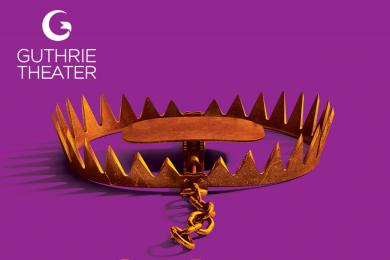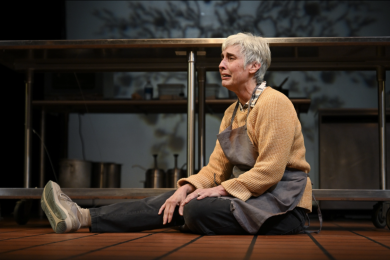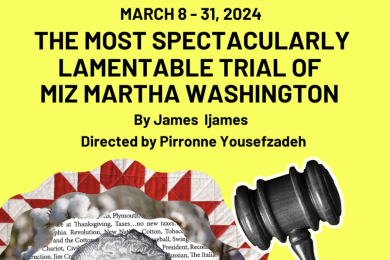Disturbing. And fun?
Review
In a few weeks, Kander & Ebb’s Scottsboro Boys will be leaving the Guthrie and taking its seat on the hallowed grounds of Broadway. While I’ve never been to Broadway, let alone New York City, I guess I can now say that I’ve seen a real Broadway musical. Was it worth it?
My initial opinion, after leaving the Guthrie with my soul bruised and my eardrums dancing, was a fervent, Hell yes! I thought it was funny, jaunty, darkly irreverent; the songs, while not entirely memorable (for example, I know the tunes to a few Wicked songs not because I’ve seen it, but because they were sung among my peers for a while), at least served to move the plot and deepen the texture of the story. The set was cool, with each location in the story represented by the rearrangement of Lego-like interlocking silver chairs.
A week and some days later, however, I’m not so sure. I still think Scottsboro Boys was slick and impressive and, yes, jaunty; but I think the word jaunty gives away the troubling dichotomy the show makes in my mind. In its percussive forward motion, the show gave me few opportunities to reflect as I watched it; I think many in the audience half-expected the minstrel-show theme to culminate with actors in blackface, but that incident came and went with a few groans and much applause. It was much too much fun to cheer, rather than give in to moral outrage.
Jaunty. Jaunty is what the Interlocutor, the show’s sole white actor, desires when he demands the Boys sing him a sweet tune about the glory of the South. Jaunty seems to me the way these men were forced to act during their post-penal conscription into a minstrel act called, duh, the Scottsboro Boys. I start to feel bad when I realize how much I enjoyed this jaunty show, but then I remember that the subject matter and presentation were probably calculated to produce this effect within me.
I don’t think the Scottsboro Boys was calculated to offend. I’m not sure it was even calculated to produce guilt in the viewer. If the creators had wanted to produce guilt, or if they’d wanted to hold a cultural mirror to the audience, they’d have picked a more-contemporary subject, rather than holding a gauzy looking-glass up and saying, Take a peek at our naughty shared history. Like the other Kander & Ebb musicals I see referenced these days, Chicago and Cabaret, Scottsboro Boys uses history and time to distance itself from its subject matter. When minstrel shows are extinct, they can be used for subversize theatrical purposes (I guess). When gangster Chicago and unstable Weimar Germany are history, then, Pop! goes the romanticizing.
So, as I said, Scottsboro wasn’t calculated to offend, or to guilt-trip, even. It was calculated to entertain and to disturb, and it succeeds, mightily. And I ate that shit up.
The closest brethren to Scottsboro that I can think of is Quentin Tarantino’s Inglourious Basterds, which, like all other Tarantino films, glorifies and aestheticizes graphic violence, in this case—vigilante killings and the Nazis themselves. It’s thrilling and fun to see Hitler get riddled with bullets and subsequently melted. One Nazi is executed with a baseball bat. And so on. But the film implies that it’s okay to view this violence and to enjoy it, because Nazis are (in that iteration) extinct, and the “good guys” won. Likewise, Scottsboro Boys allows you to feel exhilarated despite the minstrelsy because minstrel shows, lynchings, and systemic judicial injustice are extinct.
Or are they?
After writing down these thoughts, I’m at a more ambivalent middle ground concerning Scottsboro Boys. The events depicted are horrid, the method of depicting them is jaunty and fun, and the show is analogous to the ways we still treat people: the Scottsboro trial was a show, and base instincts were tapped to keep those Boys in prison. Whether it’s racism or just plain Dark Human Nature, we enjoy the spectacle when we’re in the audience, and oftentimes ignore the misery of our fellow human beings who are the subjects of this spectacle. In its special, subversive way, the Scottsboro Boys got me thinking about why we react the way we do, and it troubled me about my own reaction.
That, and it’ll probably win a few Tonys.




